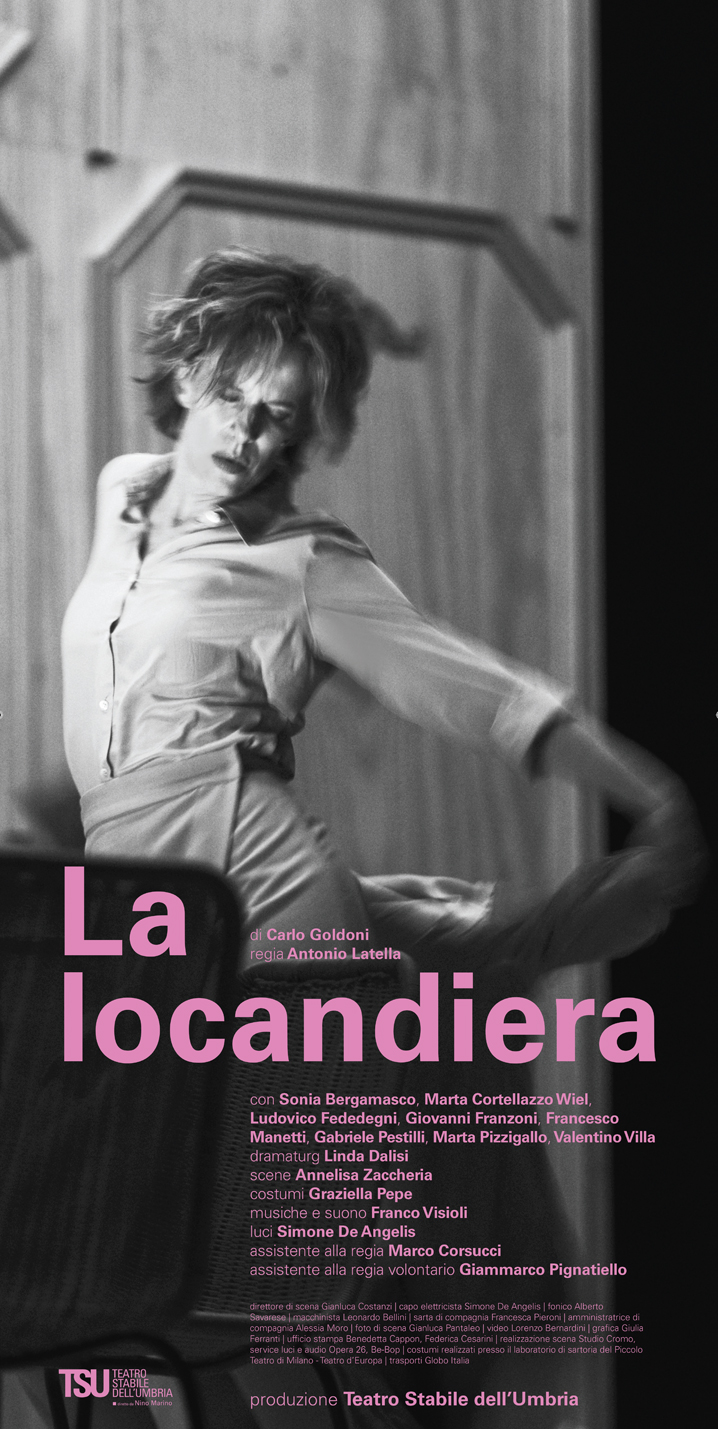The Mistress of the Inn
by Carlo Goldoni
directed by Antonio Latella
with Sonia Bergamasco, Marta Cortellazzo Wiel, Ludovico Fededegni, Giovanni Franzoni, Francesco Manetti, Gabriele Pestilli, Marta Pizzigallo, Valentino Villa
dramaturgy by Linda Dalisi
sets by Annelisa Zaccheria
costumes by Graziella Pepe
musics and sound by Franco Visioli
lights by Simone De Angelis
assistant director Marco Corsucci
production Teatro Stabile dell’Umbria
One of the most successful and performed of Carlo Goldoni’s works, La locandiera, according to Antonio Latella, is based on «the theme of inheritance, which is the cornerstone of everything – explained Latella –.
Sitting at her father’s side on his deathbed, Mirandolina inherits the Inn, as well as the order to marry Fabrizio, the head server at the Inn. With this work, I believe that Goldoni sought to make a powerful and extreme artistic gesture, a gesture that is shockingly contemporary; above all, we are dealing with the first Italian work to have a woman as its lead character, yet Goldoni goes further, dismantling every type of mechanism, elevating a woman formally at the service of her customers to a woman capable of defeating the entire male universe, and above all a woman who annihilates the aristocracy with her skills. In one fell swoop, Mirandolina manages to do away with a knight, a count, and a marquis. By choosing her server to be her husband, she makes a political choice, takes her role as head of all the servers, ennobles merchants and artists, and turns the Inn into a place where the entire theatrical history of our country is re-written, a history that in some sense concerns us all.»
Sonia Bergamasco brings life to a Mirandolina that differs from what tradition has often presented, underscoring the depth of Goldoni’s approach. «Often, – continues Latella – we have belittled the cultural and artistic work that Goldoni achieved with this piece. We have re-dimensioned it, succumbing to the obvious and reducing femininity to what men want to see, a game of seduction. However, Goldoni made this his testament, a grand civil and cultural operation. Our mediocrity has never been worthy of Goldoni’s works, and it is highly likely that I will not be, either. However, my hope is that I am able to pay tribute to a maestro who, with Goldoni, was able to rewrite a part of Italian theatrical history; Massimo Castri.»
Antonio Latella
- Sonia Bergamasco è "La locandiera" di Antonio Latella di Alessia de Antoniis, Globalist - 21 aprile 2024
- "Sonia Bergamasco moderna Mirandolina goldoniana per Latella" di Paolo Petroni, Ansa - 18 aprile 2024
- "Una locandiera fluida" | L'intervista di Rodolfo Di Giammarco, TrovaRoma - 11 aprile 2024
- "Latella e il volto sottile di Mirandolina" di Magda Poli, Corriere della sera - 4 aprile 2024
- "Sonia Bergamasco è “La locandiera” secondo Antonio Latella" di Mario Bianchi, Krapp's Last Post - 7 marzo 2024
- "Per capire l’arte ci vuole una sedia. Teatro, “La locandiera” con Sonia Bergamasco. A Milano poi in tournée" di Floriana Conte, beemagazine - 6 marzo 2024
- "LA LOCANDIERA, EROINA FEMMINISTA?" di Chiara Palumbo, Cultweek - 1 marzo 2024
- “La locandiera” al Piccolo di Milano: una rivoluzione del canone rappresentativo di uno dei classici della commedia italiana, di Rinaldo Caddeo - Script&Books - 24 febbraio 2024
- Sonia Bergamasco "La mia Locandiera libera e femminista combatte con gli uomini, non contro di loro“ | L'intervista di Adriana Marmiroli, La Stampa - 21 gennaio 2024
- Sonia Bergamasco "La mia Locandiera donna davvero libera“ | L'intervista di Sara Chiappori, la Repubblica Milano - 19 gennaio 2024
- "Locandiera d'oggi" di Livia Grossi, Corriere della sera Milano - 19 gennaio 2024
- "Mirandolina donna moderna di un capolavoro senza tempo" di Laura Fedrigo, instArt webmagazine - 1 December 2023
- "Sonia Bergamasco formidabile Mirandolina innamorata" di Valeria Ottolenghi, Gazzetta di Parma - 19 November 2023
- "Com'è moderna Mirandolina quando gioca con lo Shangai" di Rodoflo di Giammarco, la Repubblica - 9 November 2023
- "Un’ars amandi al femminile. La locandiera di Antonio Latella" di Ilaria Rossini, teatroecritica - 9 November 2023
- "La locanda dove esplodono i nostri conflitti sociali" di Maddalena Giovannelli, il sole 24 ore - 6 November 2023
- "Latella romanziere. Bergamasco locandiera. Da premio" di Roberto Canziani, QuanteScene! - 31 October 2023
- "LA LOCANDIERA" di Francesco Bettin, sipario.it - 30 October 2023
- "Una Locandiera chiamata Desiderio" di Massimo Marino, Doppiozero - 27 October 2023
- "LA LOCANDIERA @ Teatro Duse: Air B&B" di Redazione Gufetto Bologna - 24 October 2023
- "Mirandolina: la donna che sconfigge tutto l'universo maschile" di Severino Boschetti, operateatro.it- 22 October 2023

















